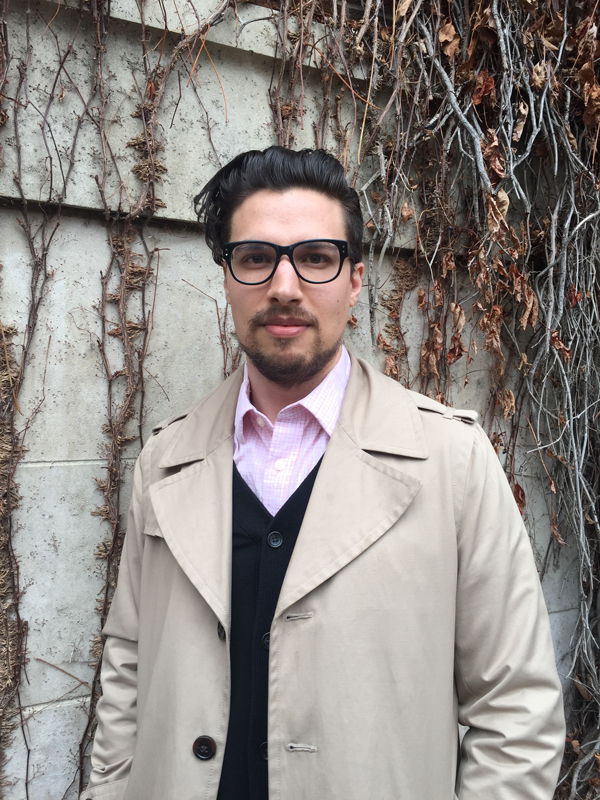
Peter Sabo, Belzberg Lecturer in Jewish Studies
Viewers of the recent Hulu adaptation of Margaret Atwood's Handmaid's Talemay not be aware that Atwood's story is based on a story in Genesis from the Hebrew Bible. In the passage, one of Jacob's wives, unable to conceive, offers her maid in child-bearing servitude to her husband. The maid, or handmaid, conceives four sons.
"By today's standards, it's not a very feminist text," says Peter Sabo, an instructor in the Faculty of Arts' Religious Studies program and the inaugural Belzberg Lecturer in Jewish Studies. "But Atwood uses what's available to her to tell this interesting story about issues of feminism and masculinity in contemporary society."
The Handmaid's Tale is one example of how religion informs and permeates our culture, but as Sabo notes, worldwide, more than 80% of the world's population self-identify as religious. While the majority identify as Christian, Muslim, Buddhist or Hindu - Judaism, at just 14 to 16 million adherents - exerts an influence far beyond its comparatively small numbers. And as Sabo notes, the history of the Jewish people, likewise, has an influence that is inversely proportional to its size. Studying the Hebrew Bible is therefore fundamental not only to an understanding of Judaism, but also Islam, Christianity, and the entire history of western civilization.
"If you're going to have a robust religious studies program, you have to study the book that arguably has been the most influential on all other religious texts in the western tradition, period," says Sabo. "I'm very happy on a personal level and for what this does for the University of Alberta's Religious Studies program."
While the Hebrew Bible and Introduction to Judaism courses have been taught at the University of Alberta for many years, with the retirement of Francis Landy in 2015, the future of these foundational courses in Religious Studies lay in question. The Faculty of Arts and its community members, including the Jewish Federation of Edmonton, spearheaded a fundraising campaign that quickly exceeded its $500,000 goal, resulting in the establishment of the Belzberg Professorship in Jewish Studies, named in honour of Sam and Frances Belzberg, major contributors and supporters of the campaign. On July 1, 2018, Sabo was appointed the inaugural lecturer for a five-year term.
Born and raised in Leduc, Alberta, Sabo was drawn to the Religious Studies program because of Francis Landy, who served as both a mentor and supervisor for his master's and PhD programs. "He drew me to the area of the Hebrew Bible and literature, and then Jewish Studies," he says, adding that Ehud Ben Zvi was also instrumental in shaping his research focus, which examines literary, feminist, and deconstructionist readings of the Hebrew Bible and its impact on contemporary culture, politics, and identity.
Sabo says that with the Hebrew Bible and Introduction to Judaism as foundational courses, new courses in Jewish Studies will build the capacity of the program, including a Second Temple Judaism course which will cover the period in Jewish history between 530 BCE and 70 CE.
"A lot happened during this time," he says. "It's the history of what became normative Judaism for the next millennium and a half, but also the story about the origins of Christianity. In 70 BCE the second temple was destroyed, proliferating rabbinical Judaism on the one strand, and Christianity on the other. So it's a course that's very important to the history of Judaism and Christianity."
In the second term, Sabo will be teaching The Bible as/and Literature. The first part will look at the way the Bible, particularly the Hebrew Bible, works as literature and the way it can be read like that, and the second half will consider all the ways literature, art, movies, and pop culture still use the Bible, including Atwood's Handmaid's Tale.
Margaret Atwood is also the subject of Sabo's forthcoming book (with Rhiannon Graybill), "Who Knows What We'd Ever Make of It, If We Got Our Hands on It?": The Bible and Margaret Atwood (Gorgias Press). The title refers to Atwood's character Offred, who laments the missed opportunities to read the bible, now under lock and key, while it was still available.
He expects the book will be published some time in 2019.
Sabo says that most students come to his classes with preconceptions about the Hebrew Bible, Judaism and religious studies in general. Challenging his students to think critically about these assumptions and prejudices is part of his job as a scholar, says Sabo, who was recognized with a Graduate Student Teaching Award in 2017.
"I try to make the strange familiar and the familiar strange," he says. "Students come with this idea that the Bible is this pious text, and of course it's a sacred book, but it is full of the messiness of the world. To use examples from Jewish Studies, a lot of the rituals seem very foreign to them, but my goal is to say, humans aren't nonsensical; they like to do meaning-making things."
"Fundamentally, religious studies is anthropological studies. We study what humans do, and if I can help them see that what appears to be strange is really something we all do - regardless of our religious or ideological leanings - then I've done something good."